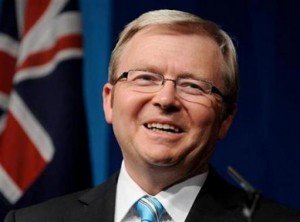The Australian parliament today rejected plans to implement a carbon trading scheme aimed at lowering greenhouse gas emissions.

The Rudd Government’s Carbon Pollution Reduction Scheme (CPRS) was defeated by 42 votes to 30. It can be re-introduced after a three month period.
Here are some background fact sheets about the proposed Australian carbon trading scheme.
And a useful fact box on Australia’s carbon footprint put together by Reuters.
The Australian Science Media Centre is gathering reaction from experts. Feel free to use the quotes below in your stories. Any further comments will be posted on the AusSMC website at www.aussmc.org.
If you would like to speak to an Australian expert, contact the AusSMC on +61 8 8207 7415 or by email.
Dr Frank Jotzo is a Research Fellow and Deputy Director of the Climate Change Institute at the Australian National University in Canberra. His expertise is in economics and climate change.
“Today’s vote may look like a setback for climate policy, but actually it is a step along the way towards comprehensive emissions control policies in Australia. The gulf between the major parties about emissions trading is not really that wide. The government’s scheme certainly has its flaws, and the hope is that it will be improved rather than watered down before the Senate votes on it again later in the year. For the Copenhagen negotiations, it would be helpful if Australia has domestic legislation in place before December. It would send a positive signal, and help Australia take a leadership role. Helping lead the global effort is important, because among developed countries Australia has the most to lose from climate change.”
Dr Ben McNeil is Senior Research Fellow at the Climate Change Research Centre, University of New South Wales and author of the book “The Clean Industrial Revolution”.
“It’s a very sad indictment of the state of Australian politics given three parties can’t negotiate to pass such important legislation that intends to transform the Australian economy to a low carbon future before the inevitable global transition. Delaying means we miss the global opportunities in new clean low carbon industry.”
Professor Barry Brook is Sir Hubert Wilkins professor of climate change and Director of Climate Science at the University of Adelaide’s Environment Institute.
“I am not surprised that the Senate has voted down the CPRS. The Greens refuse to support this legislation because its carbon reduction targets are totally misaligned with the magnitude of cuts the science says is required.
“Further, the model of cap-and-trade proposed in the CPRS will do nothing significant to restructure our energy economy, which is ultimately what is the crucial benchmark, as Garnaut and others tried to point out. The Coalition refuses to support the CPRS because (among other reasons) it unnecessarily churns money from the energy sector to households and back to the energy sector, with little apparent gain in terms of carbon reductions or increases in efficiency.
“Disappointingly, no party seems able to come up with an alternative scheme that does much better, is workable, efficient, and actually forces the required rapid and coordinated restructuring of the energy generation and supply sectors: including low-carbon electricity (renewables and nuclear), energy storage and backup, transmission upgrades, transport fuel substitution, alternative industrial processes, and efficiency gains.
“The refusal of the Government to separate the cap-and-trade system (CPRS) from the 20% by 2020 renewable energy target (RET) is galling and totally unwarranted. The two schemes represent quite different and complementary approaches to carbon mitigation. The first relies on market forces driven by supply and demand, the second is about trying to pick technological winners. Whether or not you agree with the notion that renewable energy is the technology to pick (I strongly favour a predominance of nuclear power as the most cost effective and logistically feasible sustainable solution to carbon mitigation), the non-negotiable pairing of the CPRS-RET has no rational scientific or economic basis.”
Further Information
To talk to New Zealand experts, please contact the Science Media Centre on tel: 04 499 5476 or email: smc@sciencemediacentre.co.nz.